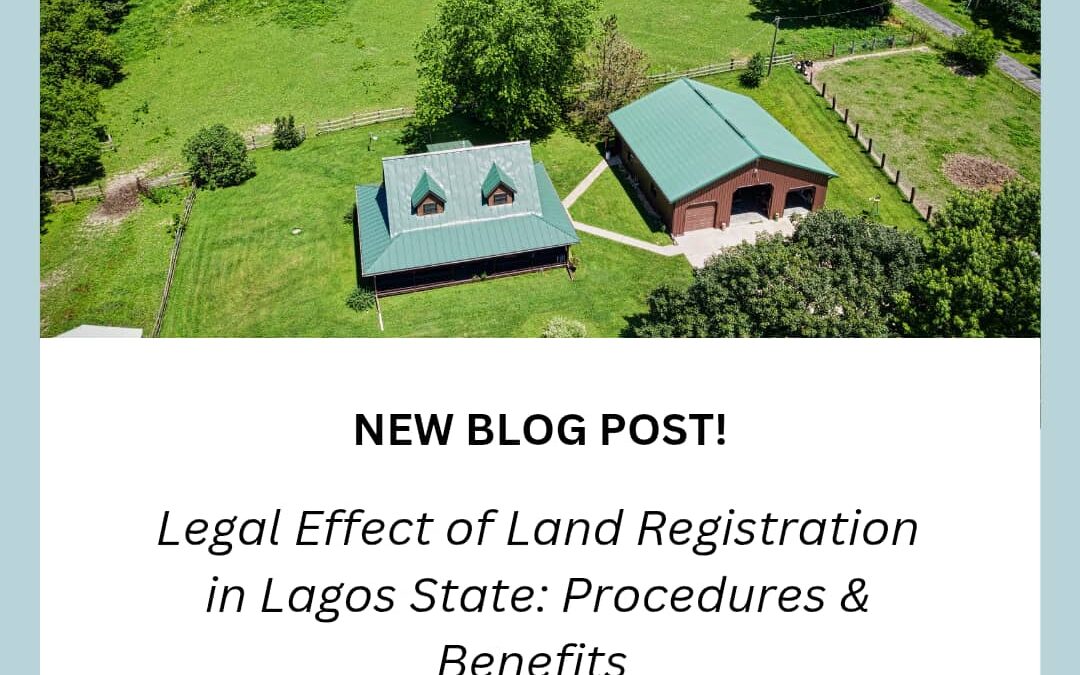Introduction
Land is generally defined expansively to include not only the surface of the earth and the subsoil, but also all appurtenances permanently attached to the land[1]. Land registration in Nigeria refers to systems by which matters concerning ownership, possession, or other rights in land are recorded, usually with a government agency or department, to provide evidence of title, facilitate transactions, and prevent unlawful disposal, which may vary according to jurisdiction[2]. Land registration is the cornerstone of modern land governance, serving as the interface between property rights, market functionality, and state control. One of its primary goals is to ensure tenure security, facilitate real estate transactions, and provide a reliable legal record of land ownership and interests[3].
Ownership of land in Nigeria represents a valuable and rewarding investment, as land generally appreciates over time. The acquisition and transfer of land are sensitive legal transactions that require due diligence, as they can greatly impact the rights and interests of the purchaser, either positively or negatively. Registration of title in Nigeria is a product of statute; the Land Use Act of 1978 is the primary legislation that governs registration, transfer, and perfection of land titles in Nigeria. The Act vests all land within a state in the Governor, excluding federal lands, to hold in trust and administer it for the benefit of all Nigerians[4]. As a federation, states in Nigeria have enacted subsidiary laws and regulations for registering land titles in their respective states. In this regard, the Land Registration Law, 2015, is in force in Lagos State. When an applicant is allotted land by the Government or purchases land from others, such conveyances must be registered.
This article examines land registration in Lagos State, its benefits, procedures, and documents required for title registration processes.
Legal Framework Governing Land Transactions in Lagos State
Several laws regulate land transactions, categorized as follows:
- The 1999 Constitution
- The Land Use Act 1978, Cap L5 Laws of the Federation of Nigeria 2004
- Land Registration Law of Lagos State, 2015
- Property and Conveyancing Law, 1959
- Town Planning Laws
- Administration of Estate Laws
- Companies and Allied Matters Act, 2020
- Stamp Duties Act
- Wills Law
Categories of Land Ownership Interests in Lagos
In Lagos, land ownership is divided into various categories of interests. The type of interest held by a seller determines the nature and extent of the rights a buyer can acquire:
- Freehold Interest: Although largely abolished by the Land Use Act, a limited number of properties with pre-1978 freehold titles still exist.
- Leasehold Interest: The most prevalent form of land ownership, typically granted by the Governor for a fixed term, usually 99 years.
- Family or Communal Land: Owned by indigenous families or communities. In this instance, buyers must ensure that all recognized family heads or authorized representatives consent to the sale to prevent future disputes.
The Land Use Act expressly prohibits the alienation of interests in land without the consent of the Governor[5]. It further provides that any transaction or instrument which purports to alienate any interest or right over land other than in accordance with the provisions of the Act shall be null and void.[6] The purport of the above provisions is to the effect that where there is alienation of interests in land, either by way of assignment, mortgage, transfer of possession, sublease, or otherwise, without prior consent of the Governor, such alienation will be rendered null and void[7]. This consent is a condition precedent to the validity of the land transaction and one of the three stages of title registration, i.e., Consent, Stamping, and Registration[8].
Land Registration Procedures in Lagos State
Lagos is one of the most populous cities in Nigeria, which has an estimated population of over 15 million residents. The state’s geography is characterized by a network of sandbars, islands, and lagoons[9]. The framework governing land registration in Lagos State is primarily established under the Land Use Act and the Land Registration Law of Lagos State[10]. The Lands Registry (also known as the Lands Bureau) is statutorily vested with the responsibility of maintaining an accurate, up-to-date record of all land transactions within the State. For land to be duly registered in Lagos State, such land must first be properly surveyed and charted, and the Governor’s consent obtained in accordance with the provisions of the Land Use Act[11]. The land registration process generally involves six key stages:
- Conducting a search
- Survey and charting of the land
- Obtaining Governor’s consent and
- Payment of Statutory fees
- Formal registration of the title or instrument
- Issuance of Certificate of Occupancy (C of O)
- Conducting a Search
Prior to purchasing any land or property in Lagos state, it is imperative to conduct a land search at the Lagos State Land Registry or by submitting an application online. This exercise verifies the status of the land, authenticates the seller’s title, and confirms that the property is free from encumbrances such as government acquisition, legal disputes, or existing mortgages. To conduct a search, the prospective purchaser or their legal representative must submit a formal application to the Land Registry, accompanied by a copy of the land survey plan and any existing title documents. It is important to note that a land search can only be conducted for properties with an existing registered title. In cases where the land is unregistered, verification must be undertaken through a process known as charting at the Office of the Surveyor-General. Charting provides essential information on the land’s status, including whether it falls under any form of government acquisition.
Documents required for a land search:
- Title document
- Copy of the survey plan
- Formal application letter
- Valid means of identification
- Preparation of Title Documents
Once it is confirmed that the land is free from encumbrances, the next step involves preparing the relevant title document for registration, typically a Deed of Assignment. A Deed of Assignment is a legal instrument that formally transfers ownership of the land from the vendor to the purchaser[12], Which must be prepared by a qualified legal practitioner and should contain the following details:
- Full names and addresses of the assignor (seller) and assignee (buyer)
- Detailed description of the land, including its size and location
- Root of title (history of ownership)
- Consideration (purchase price)
- Terms and conditions governing the transfer
The Deed of Assignment constitutes the principal evidence of the transaction and is a vital document in the registration process[13].
2. Instruments Requiring Governor’s Consent
The following registrable instruments require the prior consent of the Governor before registration; Deed of Assignment or Property Transfer Title Deed, Mortgage, Lease exceeding three (3) years, and Deed of Gift. An applicant seeking to obtain Governor’s consent is required to apply to the Lands Bureau by completing all relevant forms and attaching the following documents[14].
Documents required for Governor’s Consent:
- Duly completed and executed land forms
- Certified True Copy (CTC) of the root of title
- Original copies of the Deed or Instrument of Transfer, each annexed with a chartable survey plan
- Passport photographs of the assignee or vendor
- Certificate of Incorporation (for companies or registered institutions)
- Site photograph showing date and time
- Site location sketch
- Receipts for charting and endorsement fees
- Means of identification of the applicant or agent, and
- A covering letter containing functional telephone numbers and email addresses.
3. Payment of Statutory Fees
Several statutory fees must be paid during the land registration process. The applicable fees vary depending on location, size, and value of the property, as well as the nature of the transaction.
Documents required:
- Payment receipts for all statutory fees
- Executed Deed of Assignment
- Valid tax clearance certificates
- Stamping of Documents
Upon payment of the applicable fees, the executed Deed of Assignment must be duly stamped. Stamping serves to authenticate the document and render it legally admissible in court. The Stamp Duties Act governs this process, and it is an offence to execute or rely upon unstamped land instruments in any legal transaction.
Documents required:
- Stamped Deed of Assignment
- Proof of stamp duty payment
- Registration at the Land Registry
Following the stamping and receipt of Governor’s Consent, the Deed of Assignment must be lodged at the Lagos State Land Registry for registration. Registration provides formal notice to the public and ensures that the new ownership interest is legally recognized and protected from subsequent adverse claims. Upon completion, the purchaser is issued a duly signed, stamped, and registered Deed of Assignment bearing a unique registered title number[15].
4. Issuance Certificate of Occupancy (C of O)
A Certificate of Occupancy (C of O) is an official document issued by the government confirming the holder’s right to occupy and use a parcel of land for a specified purpose, typically under a leasehold tenure of up to 99 years. Where the land has not been previously registered or lacks an existing title, the new landowner must apply for a Certificate of Occupancy rather than Governor’s Consent. The C of O serves as conclusive proof of legal ownership and is indispensable for future land transactions, including sales, mortgages, and estate planning[16].
The procedure for obtaining a Certificate of Occupancy (C of O) in Lagos State differs depending on whether the land in question is privately owned or Government allocated. For Government-allocated lands, the applicant will be required to submit the following documents:
- A formal application letter addressed to the Executive Secretary, Land Use and Allocation Committee (LUAC)
- Duly completed Allocation Form with evidence of payment
- Passport photographs
- Evidence of payment of income tax and development levy
- Survey plan, with proof of lodgment at the Office of the Surveyor-General, and
- Receipts for all applicable land charges.
Upon submission to the Land Use and Allocation Committee (LUAC), the applicant receives an acknowledgment slip and an offer of allocation letter. Once the applicant accepts the offer and makes the prescribed payments, a Letter of Confirmation is issued, indicating the plot number[17]. Following confirmation, the Scheme Officer processes the C of O application in conjunction with the digitized survey plan transmitted from the Office of the Surveyor-General. The file is then forwarded to the Secretary, LUAC, who transmits it to the Senior Special Assistant (SSA) to the Governor on Lands. The Senior Special Assistant reviews and vets the file and subsequently forwards it, along with a memorandum, to the Permanent Secretary, Land Bureau. In the absence of any objection, the Permanent Secretary endorses the file and forwards it to the Governor for approval. The Governor grants consent and electronically signs the Certificate of Occupancy, which is then transmitted to the Registrar of Titles for registration and printing of the final Certificate of Occupancy. These steps collectively confer legal validity and priority on the purchaser’s interest, ensuring that the transaction is fully perfected in accordance with the provisions of the Land Use Act and applicable land registration laws of Lagos State[18].
The significance of land registration cannot be overemphasized. Registration provides the landowner with incontrovertible legal evidence of ownership[19]. Ensures security against competing claims and confirms that the land is duly recognized under the law, the landowner can easily use the property as collateral for financial loans or mortgages, it acts as notice to the whole world, aids easy transfer of title, affords landowners easy access to Government compensation in cases of compulsory acquisition, and enhances property value. Conversely, failure to properly register land exposes parties to substantial risks, including the possibility of ownership disputes, prolonged litigation, and potential financial losses arising from invalid or contested transactions.
Proof of Ownership of Land
There are five ways in which title or ownership of land could be proved:
- Production of documents of title: This includes registered Deeds of Assignment, Certificates of Occupancy (C of O), or registered Leases.
- Acts of Selling, Leasing, or Mortgaging: Proof of numerous and positive acts of possession and ownership extending over a sufficient length of time to warrant the inference that the person is the true owner.
- Acts of Long Possession and Enjoyment: Evidence of long, undisturbed, and continuous possession of the land.
- Proof of ownership of an adjacent or connected land: Where the boundary is in dispute, ownership may be inferred from proved ownership of surrounding land.
- Proof of ownership by traditional Evidence: Proof of ownership by tracing title back to the founders of the land under customary law[20].
Conclusion
Land registration in Lagos State, as in other states across Nigeria, serves to elevate a merely contractual or equitable interest to a legal right, providing the owner with the strongest possible documentary evidence of title. In a system primarily governed by the Land Use Act, which mandates prior Governor’s Consent, registration is far from a mere formality but constitutes an indispensable safeguard. Strict adherence to all registration processes: obtaining Governor’s Consent, proper stamping, and final registration are crucial steps in securing real property investments and mitigating the risks associated with unregistered or otherwise inchoate titles.
REFERENCES
[1] See: Nwabueze. B. O., Nigerian Land Law, (Nwamife Publishers, 1982, Enugu) P. 3.
[2] Udoka, Israel S.< International Journal of Advanced Studies in Economics and Public Sector Management; Hard Print: 2354-421X Online: 2354-4228 Vol. 5, No. 2 April, 2017 > Accessed 9th October, 2025
[3] G. A. Ahiakwo, Real Property Registration in Nigeria: Examining the Legal Issues and Challenges > Accessed 9th October, 2025
[4] Section 2, Land Use Act 1978
[5] Section 22 Land Use Act, 1978
[6] Savannah Bank of Nig. & Anor vs Ammel o. Ajilo & Anor (1989) SC
[7] Polaris Bank Ltd & Ors. v Oladipo (2020) LCN/15366(CA)
[8] https://trustedadvisorslaw.com/land-registration-security-of-title-in-nigeria-step-by-step-guide-to-land-acquisition-title-perfection/> Accessed 9th October, 2025
[9] World Bank, United Nations Census, ‘Lagos Population’ <www.populationstat.com> Accessed 25th October, 2025
[10] L 41, Vol 6, Laws of Lagos State of Nigeria 2015.
[11] LUA 1978, Cap L5 Laws of the Federation of Nigeria 2004
[12] Thelawdictionary.org/Deed of assignment/Black’s Law Dictionary, 2nd Ed
[13]Ahiakwo Grace Abraham// Land registration procedures in some states in Nigeria and other jurisdictions//www.lawjournals.org > Accessed 25th October, 2025
[14] Editor, Requirements for Processing Governor’s Consent in Lagos State’ <www.landsbureau.lagosstate.gov.ng> Accessed 27th October, 2025
[15]https://www.linkedin.com/pulse/land-registration-lagos-state-procedure-requirements-ht00f/> Accessed 29th October, 2025
[16] Akari Moses Eli// International Journal of Law //www.lawjournals.org // Volume 11, Issue 6, 2025, Page No. 63-71 > Accessed 29th October, 2025
[17] Ibid
[18] Ibid
[19] Taiye Oshoboja v Alhaji Surakatu I. Amuda (1992) LLJR-SC
[20] Idundun v. Okumagba (1976) 9-10 SC 227; (1976) 1 NMLR 200
Disclaimer: This article is intended for informational and educational purposes only and does not constitute legal advice. While every effort has been made to ensure the accuracy of the information presented, readers should consult a qualified legal professional for advice specific to their individual circumstances.


